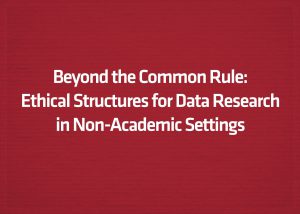Essays on Big Data and Privacy
Solutions to many pressing economic and societal challenges lie in better understanding data. New tools for analyzing disparate information sets, called Big Data, have revolutionized our ability to find signals amongst the noise. Big Data techniques hold promise for breakthroughs ranging from better health care, a cleaner environment, safer cities, and more effective marketing. Yet, privacy advocates are concerned that the same advances will upend the power relationships between government, business and individuals, and lead to prosecutorial abuse, racial or other profiling, discrimination, redlining, overcriminalization, and other restricted freedoms.
On Tuesday, September 10th, 2013, the Future of Privacy Forum joined with the Center for Internet and Society at Stanford Law School to present a full-day workshop on questions surrounding Big Data and privacy. The event was preceded by a call for papers discussing the legal, technological, social, and policy implications of Big Data. A selection of papers was published in a special issue of the Stanford Law Review Online and others were presented at the workshop. This volume collects these papers and others in a single collection.
These essays address the following questions: Does Big Data present new challenges or is it simply the latest incarnation of the data regulation debate? Does Big Data create fundamentally novel opportunities that civil liberties concerns need to accommodate? Can de-identification sufficiently minimize privacy risks? What roles should fundamental data privacy concepts such as consent, context, and data minimization play in a Big Data world? What lessons can be applied from other fields?
We hope the following papers will foster more discussion about the benefits and challenges presented by Big Data—and help bring together the value of data and privacy, as well.



